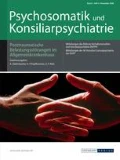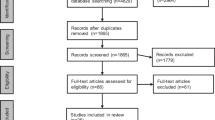Abstract
Cancer patients are subject not only to physical strain but also to substantial psychological and social stress as well as major threats and challenges. Based on systematic reviews and metaanalyses, this paper provides a critical overview of the current state of the art on the efficacy of psychosocial interventions aiming to reduce cancer patients' distress and to enhance their quality of life. A variety of psychoeducational, cognitive-behavioral and psychodynamically oriented interventions, in an individual or a group setting was demonstrated to effectively reduce anxiety and depression in cancer patients of various tumour sites and stages of the disease. However, stronger effect sizes were only shown when targeting patients at increased distress levels and with longer duration of treatment. Relaxation, hypnosis and guided imagery all proved effective in reducing the experience of pain as well as side-effects during chemotherapy and radiotherapy. In addition, consumer reports show high satisfaction of patients with psychosocial support programs. In spite of the evidence of the beneficial psychosocial effects several questions arise from the findings, such as whether the effects remain stable over time, whether or not psychotherapeutic interventions differ with regard to their specific effects, and how interventions can best be translated from research into the real-world of cancer care.
Zusammenfassung
Psychosoziale Interventionen orientieren sich an den körperlichen, seelischen und sozialen Belastungen im Gefolge von Krebserkrankungen mit dem Ziel, die Lebensqualität von Krebspatienten zu verbessern oder zu erhalten. Die vorgestellte Arbeit vermittelt einen Überblick über den aktuellen Forschungsstand kontrollierter Studien zur Wirksamkeit psychosozialer Interventionen hinsichtlich der Verminderung von körperlichen und psychischen Symptomen als Krankheits- bzw. Behandlungsfolge und der Verbesserung der Lebensqualität. Kognitiv-behaviorale und psychodynamisch orientierte expressiv-supportive Einzel- oder Gruppenpsychotherapien verringern in allen Krankheitsphasen effektiv Ängste und depressive Symptome. Höhere Effektstärken werden bei initial starker Belastungsausprägung und mit längerer Behandlungsdauer erreicht. Entspannung, hypnoide, imaginative und übende Verfahren verringern wirksam körperliche Beschwerden, wie Schmerz, Übelkeit und Erbrechen. Consumer-Report-Studien zeigen, dass teilnehmende Patienten mit professioneller psychosozialer Unterstützung hoch zufrieden sind. Offene Fragen betreffen die differenzielle Wirksamkeit verschiedener Verfahren, die Konstanz von Therapieeffekten im Langzeitverlauf, den Nutzen von paar- und familienorientierten Interventionen, und die Übertragbarkeit der Forschungsergebnisse in die klinische Versorgung.
Similar content being viewed by others
Literatur
American Cancer Society (1994) Guidelines on support and self-help groups. American Cancer Society, Atlanta
Baider L, De-Nour AK (1993) Impact of cancer on couples. Cancer Invest 3:239–243
Barsevick AM, Sweeney C, Haney E, Chung E (2002) A systematic qualitative analysis of psychoeducational interventions for depression in patients with cancer. CLIR: Center for Leadership, Information and Research 29:73–84
Blake-Mortimer J, Gore-Felton C, Kimerling R, Turner-Cobb JM, Spiegel D (1999) Improving the quality and quantity of life among patients with cancer: a review of the effectiveness of group psychotherapy. Eur J Cancer 35:1581–1586
Burke S, Kissane DW (1998) Psychosocial support for breast cancer patients: a review of interventions by specialist providers. A summary of the literature 1976–1996. NHMRC National Breast Cancer Center Report, Canberra
Deutsches Krebsforschungszentrum (2005) Heidelberg. www.dkfz.de
Devine EC (2003) Meta-analysis of the effect of psychoeducational interventions on pain in adults with cancer. Oncol Nurs Forum 30:75–89
Devine EC, Westlake SK (1995) The effects of psycheducational care provided to adults with cancer: meta-analysis of 116 studies. Oncol Nurs Forum 22:1369–1381
Edelman S, Craig A, Kidman A (2000) Group interventions with cancer patients: efficacy of psychoeducational versus supportive groups. J Psychosoc Oncol 18:67–85
Edelman S, Kidman AD (2000) Application of cognitive bahaviour therapy to patients who have advanced cancer. Behaviour Change 17:103–110
Edwards AGK, Hailey S, Maxwell M (2006) Psychological interventions for women with metastatic breast cancer. Cochrane Database Syst Rev. The Cochrane Library, Issue 3, Oxford
Fallowfield L, Ratcliffe D, Jenkins V, Saul J (2001) Psychiatric morbidity and its recognition by doctors in patients with cancer. Br J Cancer 84:1011–1015
Fawzy FI, Fawzy NW (1994) A structured psychoeducational intervention for cancer patients. Gen Hosp Psychiatry 16:149–192
Fawzy FI, Fawzy NW, Arndt LA, Pasnau RO (1995) Critical review of psychosocial interventions in cancer care. Arch Gen Psychiatry 52:100–113
Ford MF, Jones M, Scanell T, Powell A, Coombes RC, Evans C (1990) Is group psychotherapy feasible for oncology outpatient attenders selected on the basis of psychological morbidity? Br J Cancer 62:624–626
Gottlieb BH, Wachala ED (2007) Cancer support groups: a critical review of empirical studies. Psychoncology 16:379–400
Graves KD (2003) Social Cognitive Theory and cancer patients' quality of life: a meta-analysis of psychosocial intervention components. Health Psychology 22:210–219
Härter M, Reuter K, Aschenbrenner A, Schretzmann B, Marschner N, Hasenburg A, Weis J (2001) Psychiatric disorders and associated factors in cancer: results of an interview study with patients in inpatient rehabilitation and outpatient treatment. Eur J Cancer 37:1385–1393
Kaplar ME, Wachholtz AB, O'Brien WH (2004) The effect of religious and spiritual interventions on the biological, psychological, and spiritual outcomes of oncology patients: a meta-analytic review. J Psychosoc Oncol 22:39–49
Keller M (2001) Effekte psychosozialer Interventionen auf Lebensqualität und Krankheitsverlauf von Krebspatienten: Stand des Wissens. Onkologe 7:133–142
Keller M, Henrich G, Beutel M, Sellschopp A (1998) Wechselseitige Belastung und Unterstützung bei Paaren mit einem Krebskranken. Psychother Med Psychol 48:358–368
Keller M, Sommerfeldt S, Fischer C, Knight L, Riesbeck M, Lowe B, Herfarth C, Lehnert T (2004) Recognition of distress and psychiatric morbidity in cancer patients: a multi-method approach. Ann Oncol 15:1243–1249
Kissane DW, Grabsch B, Clarke DM, Christie G, Clifton D, Gold S, Hill C, Morgan A, McDermott F, Smith GC (2004) Supportive-expressive group therapy: the transformation of existential ambivalence into creative living while enhancing adherence to anticancer therapies. Psychooncology 13:755–768
Kissane DW, Grabsch B, Love A, Clarke DM, Bloch S, Smith CG (2004) Psychiatric disorder in women with early stage and advanced breast cancer: a comparative analysis. Aust N Z J Psychiatry 38:320–326
Luebbert K, Dahme B, Hasenbring M (2001) The effectiveness of relaxation training in reducing treatment-related symptoms and improving emotional adjustment in acute non-surgical cancer treatment: a meta-analytical review. Psychooncology 10:490–502
Meyer TJ, Mark MM (1995) Effects of psychosocial interventions with adult patients with cancer: a meta-analysis of randomized experiments. Health Psychology 14:101–108
Mulrow CD, Oxman AD (1997) Cochrane Collaboration Handbook. Cochrane Collaboration, Oxford
Newell SA, Sanson-Fischer RW, Savolainen NJ (2002) Systematic review of psychological therapies for cancer patients: overview and recommendations for future research. J Natl Cancer Inst 94:558–584
Owen JE, Klapow JC, Hicken B, Tucker DC (2001) Psychosocial interventions for cancer: review and analysis using a three-tired outcomes model. Psychooncology 10:218–230
Ott MJ, Norris RL, Bauer-Wu SM (2006) Mindfulness meditation for oncology patients: a discussion and critical review. Integrative Cancer Therapies 5(2):98–108
Razavi D, Stiefel F (1994) Common psychiatric disorders in cancer patients. I Adjustment disorders and depressive disorders. Supp Care Cancer 2:223–232
Redd WH, Montgomery GH, DuHamel KN (2001) Behavioral intervention for cancer treatment side effects. J Natl Cancer Inst 93:810–823
Rehse B, Pukrop R (2003) Effects of psychosocial interventions on quality of life in adult cancer patients: meta-analysis of 37 published controlled outcome studies. Patient Educ Couns 50:179–186
Ross L, Boesen EH, Dalton SO, Johansen C (2002) Mind and cancer: does psychosocial intervention improve survival and psychological well-being? Eur J Cancer 38:1447–1457
Sellick T, Crooks DL (1999) Depression and cancer: an appraisal of the literature for prevalence, detection, and practice guideline development for psychological interventions. Psychooncology 8:315–333
Sheard T, Maguire P (1999) The effect of psychological interventions on anxiety and depression in patients with cancer: results of two meta-analyses. Br J Cancer 80:1770–1780
Söllner W, Augustin M, Zschocke I (1998) Melanompatienten: Psychosoziale Belastung, Krankheitsverarbeitung und soziale Unterstützung. Ein systematisches Review. Psychother Med Psychol 48:338–348
Söllner W, DeVries A, Steixner E, Lukas P, Sprinzl G, Rumpold G, Maislinger S (2001) How successful are oncologists in identifying patient distress, perceived social support, and need for psychosocial counselling? Brit J Cancer 84:179–185
Söllner W, König A, Schiessling G,Auer V, Lukas P, Maislinger S (2004) Providing psychosocial support for breast cancer patients based on screening for distress within a consultation-liaison service. Psycho-Oncology 13:893–897
Spencer S, Carver C, Price A (1998) Psychological and social factors in adaptation. In: Holland (Hrsg) Psycho-Oncology. Oxford University Press, New York, S 211–222
Spiegel D, Classen C (1999) Group Therapy for Cancer Patients. A Research-based Handbook of Psychosocial Care. Basic Behavioral Sciences, Basic Books, New York
Stiefel F, Razavi D (1994) Common psychiatric disorders in cancer patients. II. Anxiety and acute confusional states. Supp Care Cancer 2:233–237
Tatrow K, Montgomery GH (2006) Cognitive behavioral therapy techniques for distress and pain in breast cancer patients: a meta-analysis. J Behav Med 29:17–27
Trijsburg RW, Van Knippenberg FC, Rijpma SE (1992) Effects of psychological treatment on cancer patients: a critical review. Psychosom Med 54:489–517
Uitterhoeve RJ, Vernooy M, Litjens M, Potting K, Bensing J, De Mulder P, van Achterberg T (2004) Psychosocial interventions for patients with advanced cancer – a systematic review of the literature. Br J Cancer 91:1050–1062
Van Kuiken D (2004) A meta-analysis of the effect of guided imagery practice on outcomes. J Holist Nurs 22:164–179
Wallace KG (1996) Analysis of recent literature concerning relaxation and imagery interventions for cancer pain. Cancer Nursing 20:9–87
Weis J, Domann U (2006) Interventionen in der Rehabilitation von Mammakarzinompatientinnen – Eine methodenkritische Übersicht zum Forschungsstand. Rehabilitation 45:129–145
Wiliams S, Dale J (2006) The effectiveness of treatment for depression/depressive symptoms in adults with cancer: a systematic review. Br J Cancer 94:372–390
Zabora JR, Blanchard CG, Smith ED, Roberts CS, Glajchen M, Sharp JPM, BrintzenhofeSzoc K, Locher JW, Carr E, Best-Castner S, Smith PM, Dozier-Hall D, Polisnsky ML, Hedlund SC (2001) Prevalence of psychological distress among cancer patients across the disease continuum. J Psychosoc Oncol 15:73–87
Author information
Authors and Affiliations
Corresponding author
Rights and permissions
About this article
Cite this article
Söllner, W., Keller, M. Wirksamkeit psychoonkologischer Interventionen auf die Lebensqualität der Patienten. Psychosom Konsiliarpsychiatr 1, 249–257 (2007). https://doi.org/10.1007/s11800-007-0066-0
Received:
Accepted:
Issue Date:
DOI: https://doi.org/10.1007/s11800-007-0066-0




